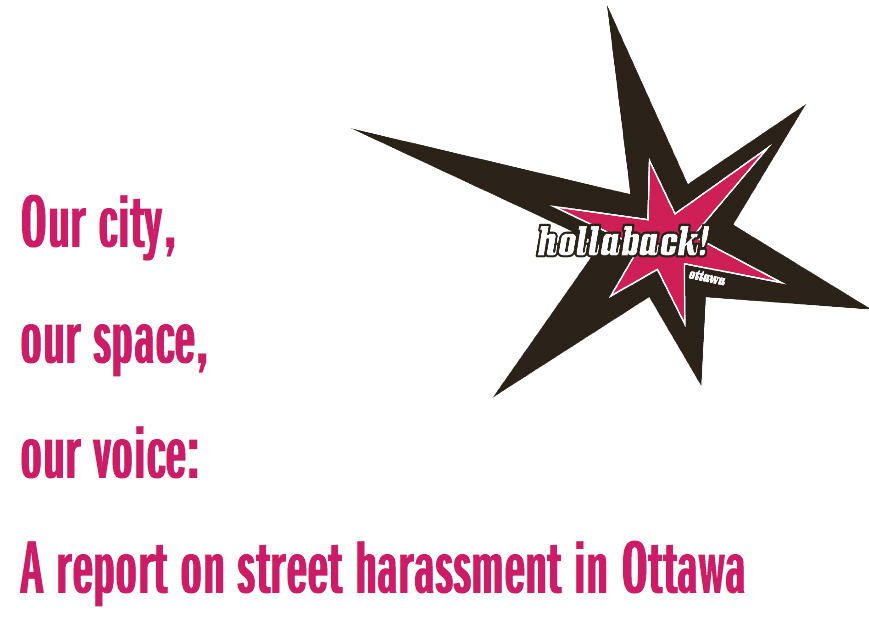By: Lisane Thirsk, Ottawa, Canada, SSH Correspondent
 Last week, Hollaback! Ottawa released Our city, our space, our voice: A report on street harassment in Ottawa. The report is based on an online survey with more than 300 respondents, as well as testimony from an open forum.
Last week, Hollaback! Ottawa released Our city, our space, our voice: A report on street harassment in Ottawa. The report is based on an online survey with more than 300 respondents, as well as testimony from an open forum.
Among other findings, it revealed that:
* 97% of respondents had experienced a form of street harassment in the past year
* 44% of respondents had experienced street harassment at least once on public transportation
* Only 10% of respondents had reported an incident of street harassment
The report has prompted some important conversation among Ottawa residents. It’s a conversation Hollaback! Ottawa’s site director Julie Lalonde initiated with city officials back in February after noting a trend in the stories submitted and mapped on the Hollaback! Ottawa website: street harassment was often taking place on buses or at bus stops.
But at the initial meeting requested by Julie, local government and public transit officials maintained that she didn’t have enough quantifiable evidence to show that street harassment is frequent on buses in Ottawa.
Julie isn’t one to be deterred. She wasted no time in calling on other local feminist organizations and Hollaback! volunteers, including myself, to help organize the forum, design the survey, and analyze the findings to better understand the problem and potential solutions.
The data compiled sheds light on a diversity of experiences (many truly horrifying), reveals other ‘hot spots’ where harassment occurs (libraries and parks), and captures the community’s determination to put an end to street harassment by engaging bystanders (amazing!).
In the lead-up to the report’s release, I had the opportunity to attend a series of follow-up meetings with Julie and city officials. The meetings became more productive and were likely granted urgency by the city following news coverage about a series of sexual assaults on buses.
Throughout these processes I kept reflecting on how the problem of street harassment was at first dismissed by officials claiming that the stories submitted to Hollaback! Ottawa weren’t themselves legitimate enough to justify further conversation.
Yet there are too many successful initiatives out there to ignore the benefits of crowdsourcing this type of information about violence against women.
Whenever skepticism about these types of initiatives blocks or delays action to stop violence, we need to ask some questions. Are women being silenced, either in person or online? Are we erasing the meaning survivors attribute to their own experiences? Why are those in positions of power so inclined to say, “But someone could have just fabricated those online submissions”?
I do understand the necessity of more traditional data-collection methods. Are there downsides to drawing conclusions from crowdsourced data? Yes. But are there also drawbacks to sexual violence data collected through formal surveys, interviews, focus groups or police records? Absolutely.
Above all, we can’t assume that all women feel safe and empowered to speak out and report street harassment, especially to authority figures. As in any country, survivors in Canada face both social and institutional barriers to reporting sexual violence. Here in Ottawa we heard over and over at the forum and in the survey responses, “Reporting is really hard.”
Hopefully the results of Hollaback! Ottawa’s report will spur more efforts to address street harassment throughout the city. The results paint a discouraging but unsurprising picture, considering the available statistics on the prevalence of street harassment globally. The low level of reporting in Ottawa is also in line with government studies showing that about one in ten sexual assaults are reported to police (Statistics Canada). With this in mind, the official number of reported sexual assaults on transit, for example, represents only a fraction of the problem in Ottawa.
What kinds of numbers will we require before taking concrete action to prevent street harassment?
To me, it’s not just the numbers that speak for themselves. The stories submitted online also speak volumes about the need for action. Let’s trust those voices too.
Lisane works in the non-profit communications sector and supports local anti-street harassment advocacy through Hollaback! Ottawa. In 2012, she completed a Master’s in Socio-Legal Studies at York University in Toronto, where she wrote her Major Research Paper on gender-based street harassment. She holds a B.A. in Latin American Studies and Spanish from the University of British Columbia.
